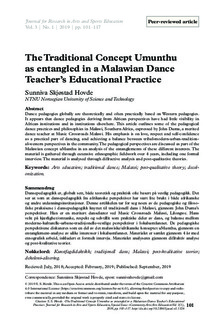| dc.contributor.author | Hovde, Sunniva Skjøstad | |
| dc.date.accessioned | 2020-03-13T11:25:30Z | |
| dc.date.available | 2020-03-13T11:25:30Z | |
| dc.date.created | 2019-01-16T08:53:19Z | |
| dc.date.issued | 2019 | |
| dc.identifier.citation | Journal for Research in Arts and Sports Education. 2019, 3 (1), 101-117. | nb_NO |
| dc.identifier.issn | 2535-2857 | |
| dc.identifier.uri | http://hdl.handle.net/11250/2646714 | |
| dc.description.abstract | Dansepedagogikk er, globalt sett, både teoretisk og praktisk ofte basert på vestlig pedagogikk. Det ser ut som at danse pedagogikk fra afrikanske perspektiver har vært lite brukt i både afrikanske og andre utdanningsinstitusjoner. Denne artikkelen tar for seg noen av de pedagogiske og filosofiske praksisene i dansepedagogikk knyttet til tradisjonell dans i Malawi, gjennom John Duma’s perspektiver. Han er en meritert danselærer ved Music Crossroads Malawi, Lilongwe. Hans vekt på kjærlighet/omtanke, respekt og selv-tillit som praktiske deler av dans, og balanse mellom moderne-kulturelle-urbane-tradisjonelle-vestlige perspektiver i lokalsamfunnet. De pedagogiske perspektivene diskuteres som en del av det malawiske/afrikanske konseptet uMunthu, gjennom en entanglement-analyse av ulike interesser i lokalsamfunnet. Materialet er samlet gjennom 4 år med etnografisk arbeid, inkludert et formelt intervju. Materialet analyseres gjennom diffraktiv analyse og post-kvalitative teorier. | nb_NO |
| dc.description.abstract | Dance pedagogies globally are theoretically and often practically based on Western pedagogies. It appears that dance pedagogies deriving from African perspectives have had little visibility in African institutions and in institutions elsewhere. This article outlines some of the pedagogical dance practices and philosophies in Malawi, Southern Africa, expressed by John Duma, a merited dance teacher at Music Crossroads Malawi. His emphasis is on love, respect and self-confidence as a practical part of dancing, and achieving a balance between tribal-modern-urban-traditional-western perspectives in the community. The pedagogical perspectives are discussed as part of the Malawian concept uMunthu in an analysis of the entanglements of these different interests. The material is gathered through extensive ethnographic fieldwork over 4 years, including one formal interview. The material is analysed through diffractive analysis and post-qualitative theories. | nb_NO |
| dc.language.iso | eng | nb_NO |
| dc.publisher | Cappelen Damm Akademisk | nb_NO |
| dc.rights | Navngivelse 4.0 Internasjonal | * |
| dc.rights | Navngivelse 4.0 Internasjonal | * |
| dc.rights.uri | http://creativecommons.org/licenses/by/4.0/deed.no | * |
| dc.title | The Traditional Concept Umunthu as entangled in a Malawian Dance Teacher's Educational Practice | nb_NO |
| dc.type | Journal article | nb_NO |
| dc.type | Peer reviewed | nb_NO |
| dc.description.version | publishedVersion | nb_NO |
| dc.source.pagenumber | 101-117 | nb_NO |
| dc.source.volume | 3 | nb_NO |
| dc.source.journal | Journal for Research in Arts and Sports Education | nb_NO |
| dc.source.issue | 1 | nb_NO |
| dc.identifier.doi | 10.23865/jased.v3.1326 | |
| dc.identifier.cristin | 1657801 | |
| dc.description.localcode | © 2019 S. S. Hovde.This is an Open Access article distributed under the terms of the Creative Commons Attribution 4.0 International License (https://creativecommons.org/licenses/by-nc/4.0/), allowing third parties to copy and redis-tribute the material in any medium or format and to remix, transform, and build upon the material for any purpose, even commercially, provided the original work is properly cited and states its license. | nb_NO |
| cristin.unitcode | 194,67,80,0 | |
| cristin.unitname | Institutt for lærerutdanning | |
| cristin.ispublished | true | |
| cristin.fulltext | original | |
| cristin.qualitycode | 1 | |

